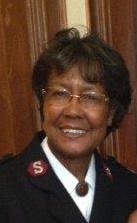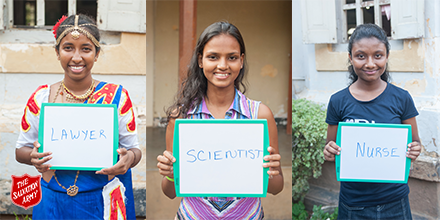The Salvation Army is actively involved with the United Nations Working Group on Girls. The purpose of this group is to promote and empower girls to take a stand and speak out for themselves.
This past October 11th was International Day of the Girl. This day was celebrated at the United Nations with a Girls Speak Out, where girls took over the UN and spoke out against violence against girls.
Voices of girls from The Salvation Army around the world were heard including contributions from Pakistan, Kenya, Brazil and several other countries.
Their purpose was to remind the world that girls are still the last when it comes to education, health care, gender issues, and their struggle with poverty issues mainly because they are girls.
There are 1.1 billion girls in the world, and every one of them deserves equal opportunities for a better future. They are a source of energy, power, and creativity. They can drive change and help build a better future for all. Yet, most girls face disadvantages and discrimination on a daily basis, and those living through crises are suffering even more.
Did you know that every ten minutes, somewhere in the world, an adolescent girl dies as a result of violence? In humanitarian emergencies, gender-based violence often increases, subjecting girls to sexual and physical violence, child marriage, exploitation and trafficking. Adolescent girls in conflict zones are more likely to be out of school when compared to girls in conflict-free countries, compromising their future prospects for work and financial independence as adults.
Across the world, empowered girls are raising their voices to fight for their rights and protection in all contexts. They are working to end violence against women and girls, to recognize indigenous rights, and to build peaceful and cohesive communities.
More than 700 million women around the world were married before their 18th birthday. About 250 million married before the age of 15.
Worldwide, one in three girls, between the ages of 13 and 15, experiences bullying regularly. This includes direct bullying such as teasing or shoving, indirect bullying such as spreading rumors, and cyber-bullying.
UNICEF is working in many ways to prevent violence against girls, including providing shelters and protected spaces; promoting girls’ education and helping girls develop life skills; supporting parents with programs like cash transfers that help reduce the risks faced by girls; and working with governments to strengthen judicial, criminal and social systems that are essential to keeping girls safe.
Girls are standing up just as Mala did, and we need to support them.

Major Victoria Edmonds
I am the Salvation Army Senior Representative to the United Nations, representing the International Salvation Army. I am an Indigenous Tuscarora Native American. A Salvation Army Officer of 33 years, working with the International Social Justice Commission since 2007 at its very beginning. It is a honor to serve.

